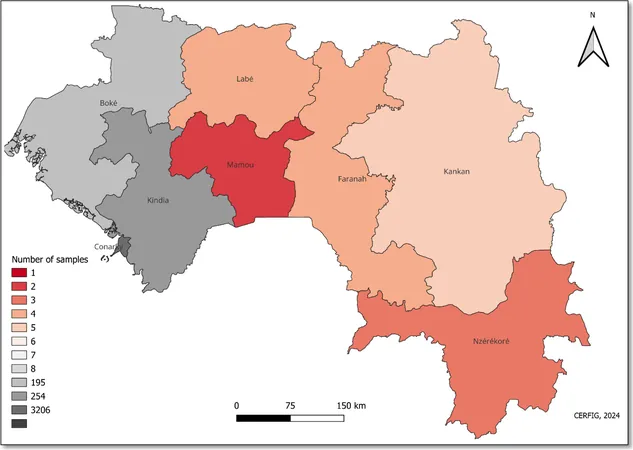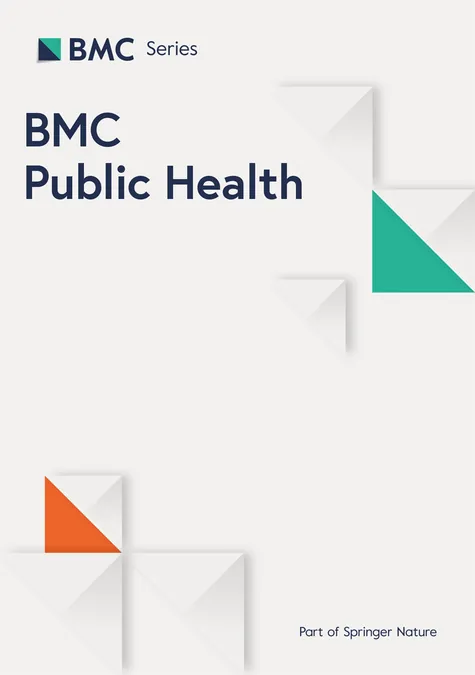
Unveiling Guinea's Battle Against COVID-19: Insights from Genomic and Epidemiological Analysis of SARS-CoV-2 Variants
2025-01-02
Author: Arjun
Introduction
In December 2019, the world was first introduced to the severe acute respiratory syndrome coronavirus 2 (SARS-CoV-2) in Wuhan, China. This virus has since wreaked havoc globally, with an alarming count of over 776 million confirmed COVID-19 cases and more than 7 million deaths reported by December 2024. Genomic surveillance has become instrumental in tracking SARS-CoV-2 variants' emergence and evolution, vital for public health responses.
Emergence of Variants
From the outset of the pandemic, various SARS-CoV-2 variants have emerged, significantly affecting transmissibility and virulence. The Alpha variant, first detected in the UK in late 2020, set off a worldwide alarm due to its heightened transmissibility. The Beta variant from South Africa followed closely, demonstrating not only increased contagion but also particular mutations that raised concerns over immune response evasion. The spread continued with Gamma and then Delta variants, which dominated the scene until the emergence of the Omicron variant in late 2021, known for its rapid mutations and the ability to spread swiftly among populations.
Genomic Surveillance in Africa
In Africa, genomic surveillance efforts picked up pace as early as 2021, with countries like Nigeria, Uganda, and South Africa leading the way in sequencing efforts that revealed the variants circulating across the continent. However, not all countries had robust surveillance capabilities, highlighting the disparities in genomic data collection in various regions.
Guinea's COVID-19 Statistics and Response
The Republic of Guinea, sitting in West Africa, has faced its unique challenges. As per the WHO report from December 2023, Guinea has reported around 38,582 COVID-19 cases with 468 deaths. The country relied heavily on diagnostic measures, including the use of reverse transcriptase quantitative Polymerase chain reaction (qPCR) to identify cases, and initiated vaccination campaigns targeting high-risk groups. By April 2023, Guinea had managed to vaccinate approximately 36% of its eligible population, with higher coverage in older demographics.
Study on SARS-CoV-2 Variants in Guinea
To better understand the variations of SARS-CoV-2 circulating in Guinea, a comprehensive study set forth to document the distribution of SARS-CoV-2 lineages throughout different waves of the pandemic. This study demonstrated the potential of genomic sequencing in tracking the virus's evolution and its variants over time.
Sample Collection and Findings
Between May 2020 and May 2023, a substantial number of samples were collected from COVID-19 treatment centers and labs in Guinea. Just under 25,000 samples were assessed, of which over 5,600 were positive, leading to 385 samples being sequenced for detailed genomic analysis. The findings revealed that Conakry, the capital, was the epicenter of viral transmission, which corroborated with trends observed in other countries where urban areas showed higher transmission rates due to greater population density.
Key Variants Identified
The genomic sequencing efforts identified key variants including Alpha, Delta, Eta, and Omicron, with findings contributing to a deeper understanding of the epidemiology of COVID-19 in Guinea. The research indicated that during the peak of the Omicron wave in 2022, there were multiple subvariants in circulation, showcasing the virus's tendency to adapt and change over time.
Cross-Border Transmission Risks
A remarkable revelation from the study was the significant number of connections and potential hotspots of transmission, especially with neighboring countries like Senegal and Nigeria, suggesting a dynamic interplay of viral strains across borders. This brought attention to the importance of continuous genomic surveillance and the potential need for collaborative efforts in public health measures among West African nations to ensure control of the pandemic.
Conclusion and Future Perspectives
As the world seeks to adjust to a post-pandemic reality, understanding the dynamics of infections in countries like Guinea is crucial. Not only does it help in better preparedness for future outbreaks, but it also shines a light on the resilient efforts being made within the healthcare systems, emphasizing the need for enhanced genomic capabilities in protecting global health. This extensive genomic analysis and epidemiological research underscore a pivotal point: the fight against COVID-19 is far from over, and understanding variants is key to conquering this ongoing global challenge. Curious about how this impacts future pandemic preparedness? Stay tuned for more updates on public health dynamics!



 Brasil (PT)
Brasil (PT)
 Canada (EN)
Canada (EN)
 Chile (ES)
Chile (ES)
 Česko (CS)
Česko (CS)
 대한민국 (KO)
대한민국 (KO)
 España (ES)
España (ES)
 France (FR)
France (FR)
 Hong Kong (EN)
Hong Kong (EN)
 Italia (IT)
Italia (IT)
 日本 (JA)
日本 (JA)
 Magyarország (HU)
Magyarország (HU)
 Norge (NO)
Norge (NO)
 Polska (PL)
Polska (PL)
 Schweiz (DE)
Schweiz (DE)
 Singapore (EN)
Singapore (EN)
 Sverige (SV)
Sverige (SV)
 Suomi (FI)
Suomi (FI)
 Türkiye (TR)
Türkiye (TR)
 الإمارات العربية المتحدة (AR)
الإمارات العربية المتحدة (AR)